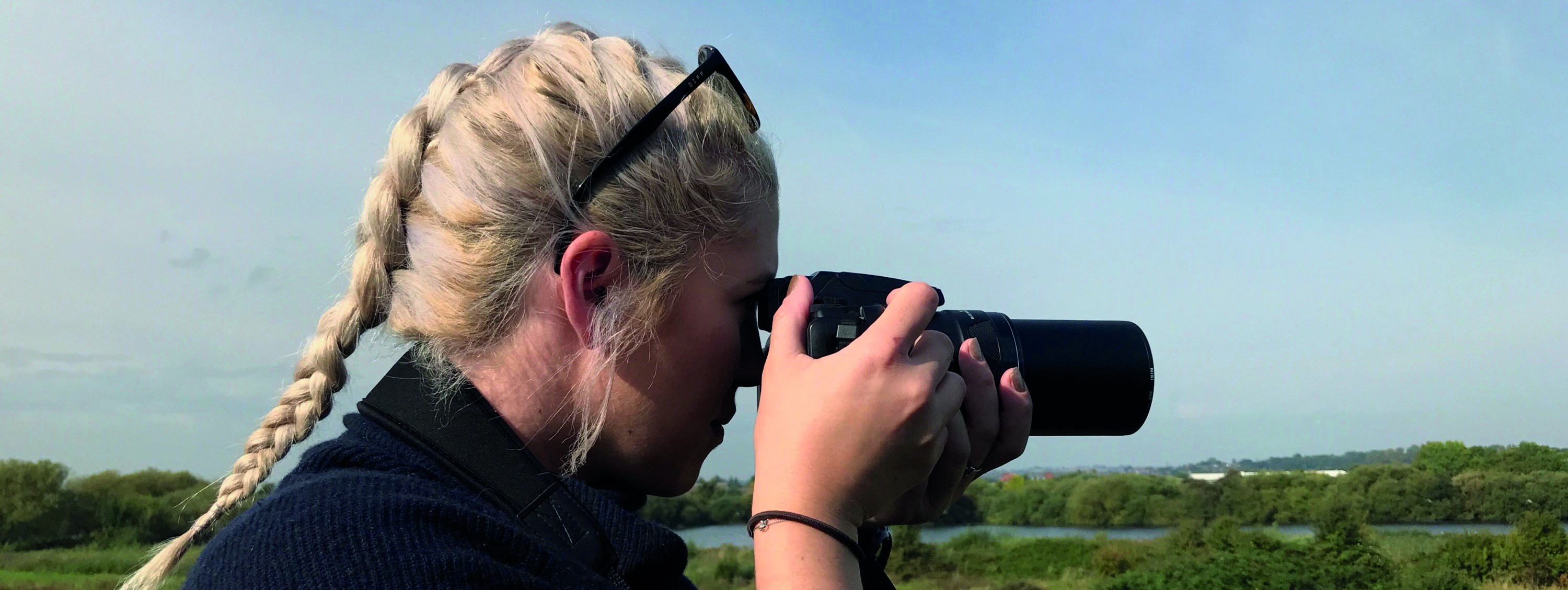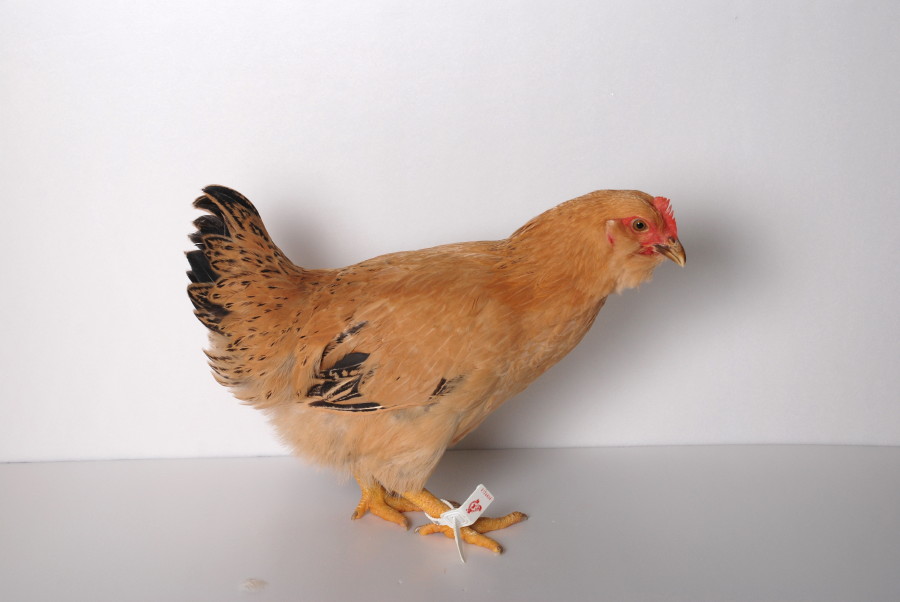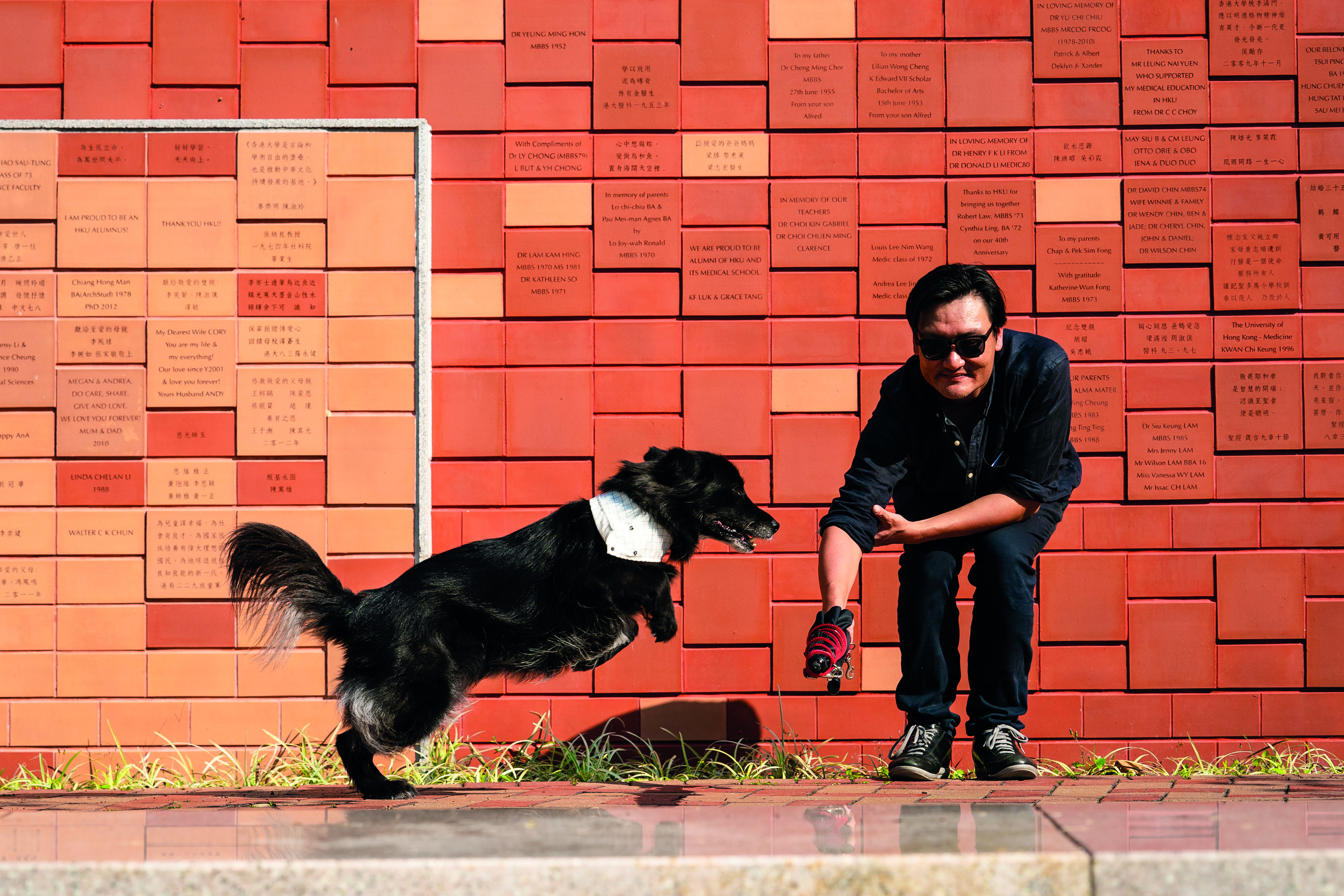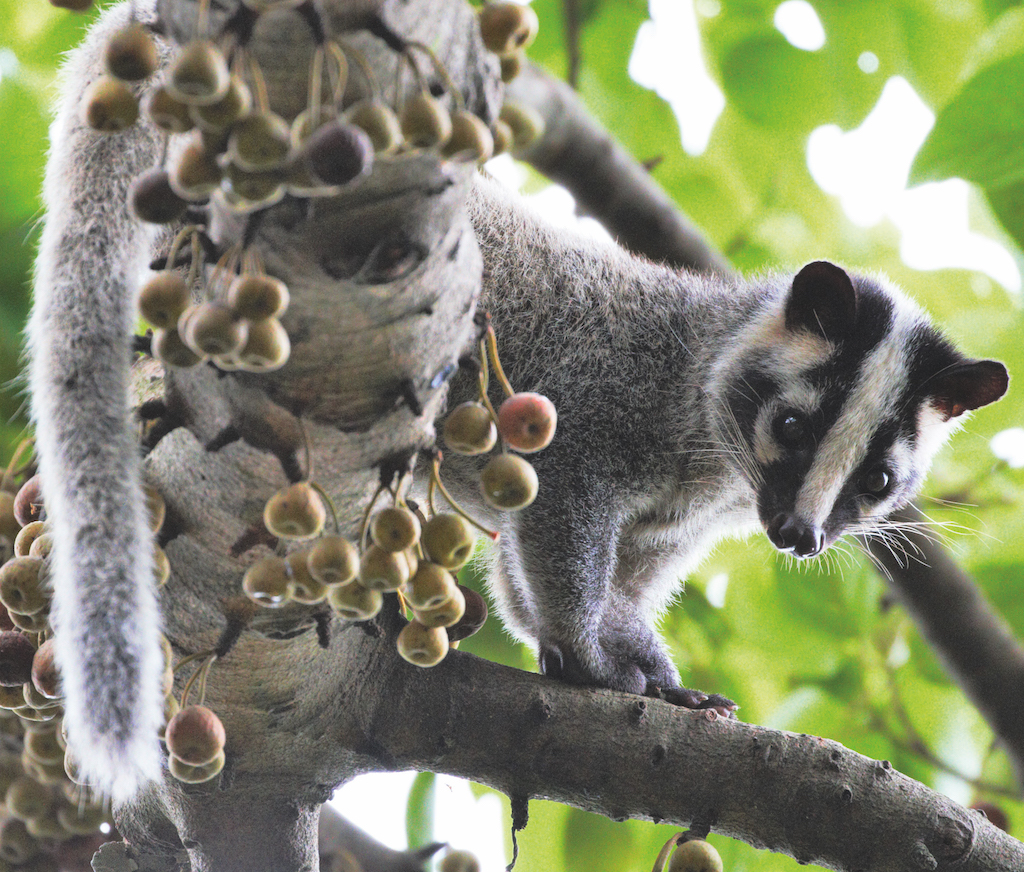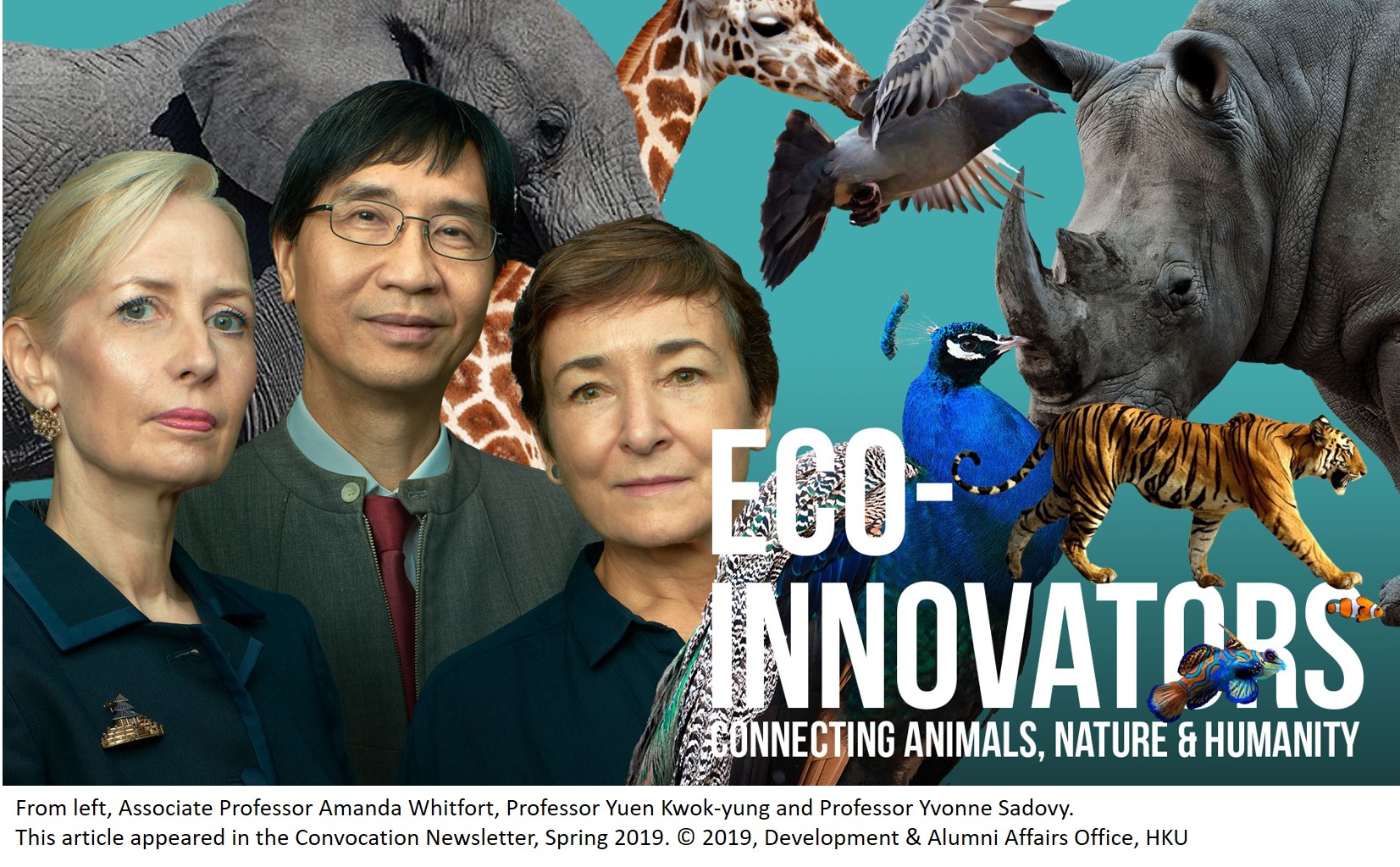
Eco-Innovators
Connecting Animals, Nature & Humanity
Law | Science | Medicine | Social Work
Across The University of Hong Kong, experts are studying the vital links between animals, humans and natural habitats — in interdisciplinary research and innovation ranging from medicine to law, and from biology to social science. They are finding real-life solutions for improving the welfare of both people and the other creatures who share our increasingly crowded and polluted Earth. HKU’s breakthroughs in animal-borne diseases have saved lives, while legal advocacy has shielded pets from abusive practices. Animal-related research at HKU has led to pioneering collaborations with the third sector: a legal scholar working alongside a University forensics lab to save African wildlife; a marine biologist working with a tech start-up on a mobile app to save reef fish; and a social scientist who uses therapy dogs to help at-risk youth. HKU alumni have also dedicated their lives and careers to caring for animals, whether by documenting natural habitats as a photographer, or saving rescued wildlife at a sanctuary. The researchers and alumni are working to discover new ways for humans to find accommodation with animals and nature, for the benefit and happiness of all.Experts Across Disciplines
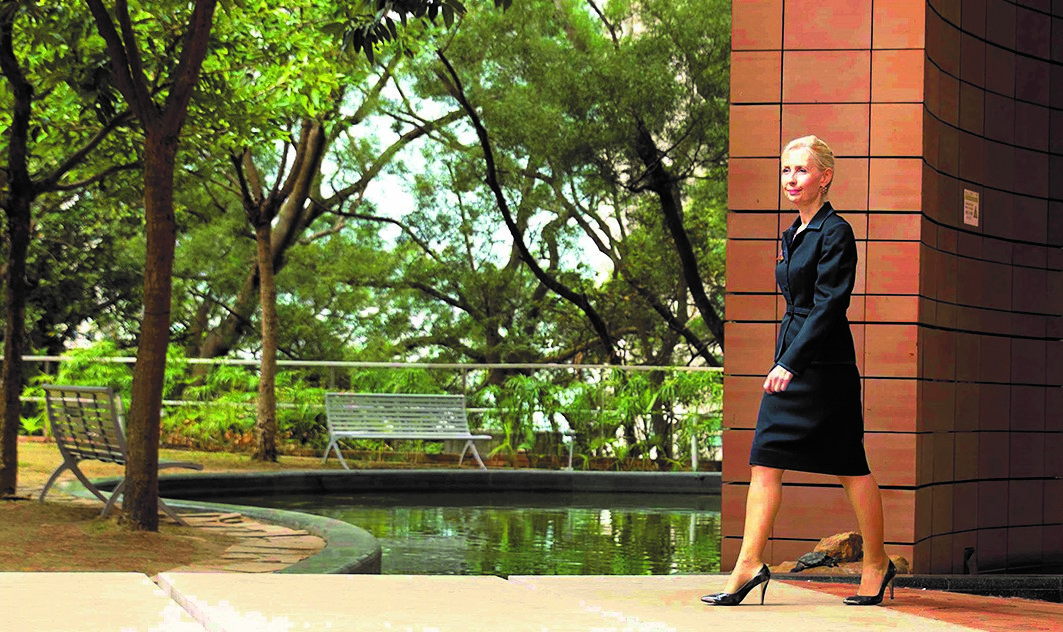
1. Advocate for Animals
Associate Professor Amanda Whitfort of the Faculty of Law uses her legal expertise to save animals locally and globally.
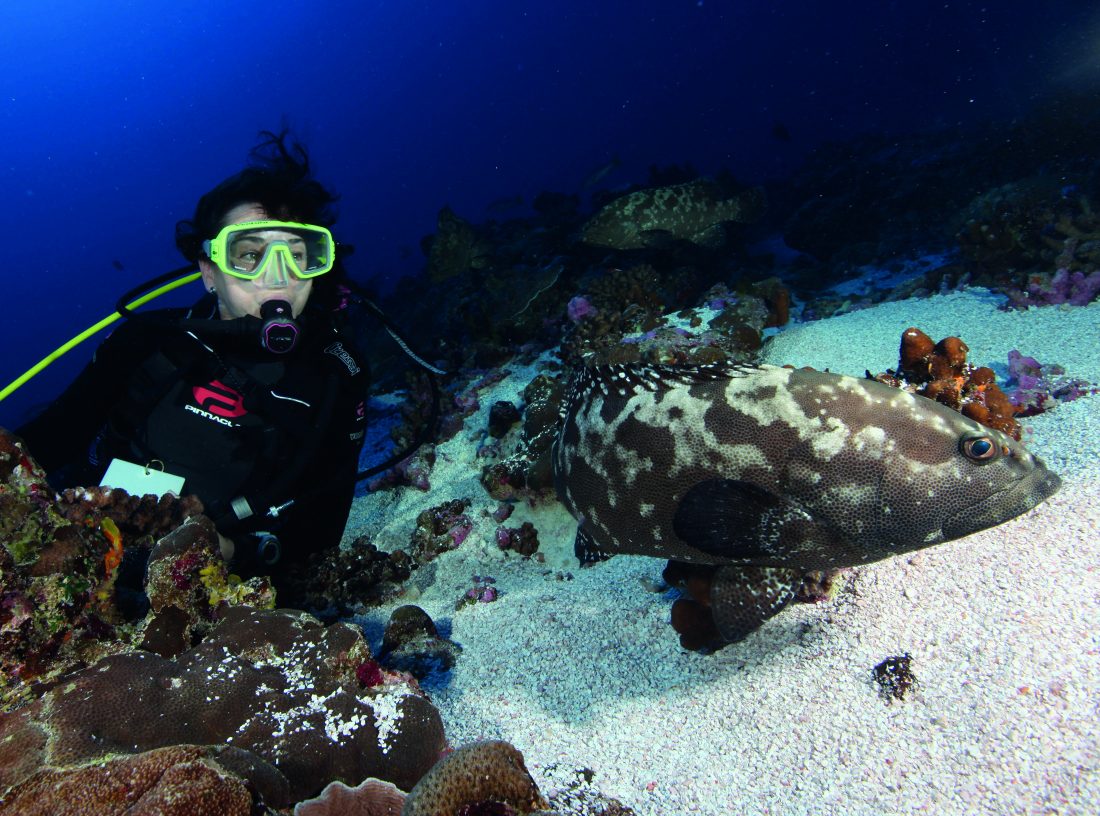
2. Deploy Tech for Ocean Life
Professor Yvonne Sadovy of the Faculty of Science, a world-renowned expert in reef fish, has been working at HKU since 1993 to advocate protection for fishes that are threatened with extinction and to achieve sustainable management of reef fish fisheries.
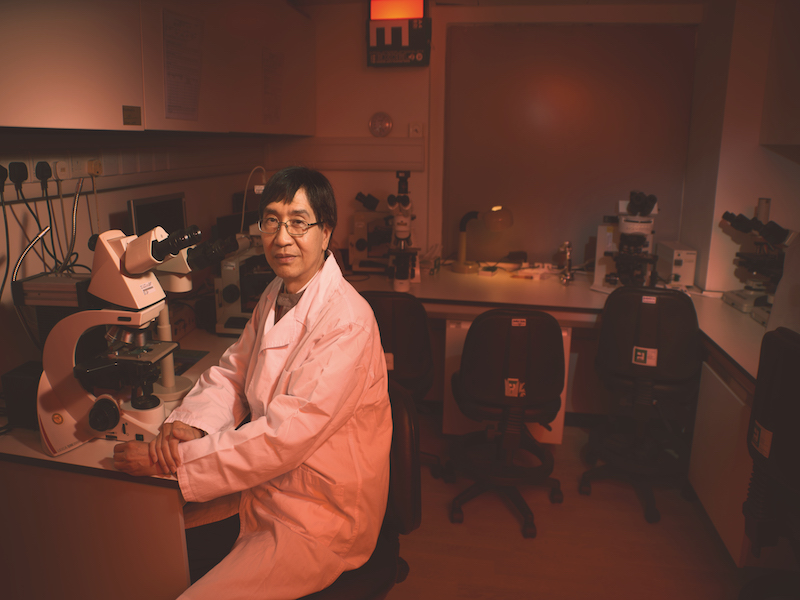
3. Respect Animals, Save Human Lives
Professor Yuen Kwok-yung of the Li Ka Shing Faculty of Medicine, an international expert in animal-borne illness, has been advocating improving human wealth by promoting animal hygiene and welfare.
Field Research
1. Termites Help Rainforests
A major new study, showing that termites help mitigate against the effects of drought in tropical rain forests, was published on the cover of Science Magazine, the authoritative US-based multidisciplinary research journal, in January 2019.
2. Shark Tourism in Cebu
Professor Yvonne Sadovy of the Faculty of Science, a world-renowned expert in reef fish, has been working at HKU since 1993 to advocate protection for fishes that are threatened with extinction and to achieve sustainable management of reef fish fisheries.
Action in Nature
1. Rescuing Animals
Dr Gary Ades (PhD 1995), who completed his doctorate in ecology & biodiversity, has worked at the Kadoorie Farm & Botanic Garden for nearly 25 years. There, he heads the Fauna Conservation Department that operates a Wild Animal Rescue Centre, the only non-governmental facility of its kind in Hong Kong.
2. Documenting Wildlife
Samson So 蘇毅雄 (BSc 1996; MPhil 2000; MJ 2008) combined the knowledge from his three HKU degrees in environmental science, ecology & biodiversity, and journalism to become a wildlife photographer and conservation advocate.
HKU’s Healthy Chickens
Today, when you buy an all-natural, locally-bred Kamei Chicken 嘉美雞, you can have HKU innovation to thank.
In 1997, Professor Daniel Chan 陳鑛安(BSc 1962; MSc 1965) a zoologist and Emeritus Professor, worked to develop a new local breed called Kamei Chickens, a collaboration with the Kadoorie Agricultural Research Centre, now known as the Kadoorie Centre of The University of Hong Kong.
The chickens have relatively low fat content, are rich in collagen, and are free of added hormones, antibiotics and harmful chemicals.
“Kamei Chickens were first introduced to the market in 2001 and fully commercialised in 2003. The production and marketing operations are carried out in Hong Kong by Vital-Health Livestock Development Ltd, a spinoff company from the University, which uses pure breeding technology,” explained Dr S C Kim, Director of the Technology Transfer Office.
“Kamei Chicken has been well received by customers. Health-conscious consumers find it an excellent choice to satisfy both their appetites, as well as their food-safety needs.”
Man's Best Friend
Regulars at HKU Libraries have probably met Jasper, the loveable and shaggy resident Library Therapy Dog. The Old English Sheepdog, who was adopted from Hong Kong Dog Rescue by a Libraries employee, has been working since 2017 to help students cope with stress, particularly during exam periods.
But Jasper is not the only dog in town.
“If you are afraid of dogs… you can sit in the front. This is called ‘flooding’ in psychology”, Dr Paul Wong 黃蔚澄, Associate Professor and a clinical psychologist at the Department of Social Work and Social Administration, said jokingly to his students as he led a canine friend into the classroom.
“I want to share with my students that human-animal interactions are more powerful in our lives than we think,” he said.
Dr Wong studies how well-trained therapy animals can help people who have difficulties dealing with modern life. He is particularly concerned with Hong Kong’s estimated 20,000 to 40,000 “socially withdrawn youth”, who lock themselves at home due to social fears. Dr Wong works with a non-profit social service organisation to use therapy animals to bring these youth out of their shell.
Watch a Knowledge Exchange video on Dr Wong’s work on human-animal bond and meet Fat Fat the Therapy Dog.
130 Years at Lung Fu Shan
龍虎山
“The Pulse of Nature” exhibit, which runs until June 9, marks the 10th anniversary of the Lung Fu Shan Environmental Education Centre, a project jointly established by HKU and the Environmental Protection Department in 2008.
“This Centre has come to play an important role in the creation of an environmentally aware society,” said Professor Matthew Evans, Dean of Science.
The area’s past stretches far beyond a decade. The exhibit will revisit the history of the bungalow at Lung Fu Shan, which has withstood 130 summers and winters. It follows the narrative of six artists, two writers, architects and former residents of this hillside retreat as they re-live the memories of the little house surrounded by city and mountain.
A bilingual book, “The Pulse of Nature – Mid-levels West感知西半山──就是自然”, has been launched in conjunction with the exhibit. Its two covers feature two local species, the Jewellery Spider and the Brown Tree Frog.
Becoming a Vet
HKU students can study to become veterinarians through two avenues.
At the Li Ka Shing Faculty of Medicine, Bachelor of Biomedical Sciences students can apply for a Graduate Entry Programme for the Bachelor of Veterinary Medicine & Surgery (BVM&S) at The University of Edinburgh. This articulation programme, first announced in 2013, allows students to obtain two degrees from two universities, and earn qualifications as veterinary surgeons in seven years.
In October 2018, HKU’s Faculty of Science announced a similar programme that allows BSc students to articulate into the Doctor of Veterinary Medicine (DVM) programme at the University of Melbourne. Graduates will be conferred two degrees from the two universities in no less than seven years. The internationally accredited programme will allow graduates to work as practicing veterinarians in many countries without further training.
East Africa Eco Tour
Dr Billy Hau 侯智恒 (BSc 1991; MSc(EnvMan) 1994; PhD 2000) , Programme Director of the MSc in Environmental Management, will be curating and guiding an East Africa Wildlife Eco-Tour in July 2019 to see the Great Migration on the legendary Masai Mara in Kenya, considered to be one of the most spectacular natural events, as well as breathtaking views of Mount Kilimanjaro in Amboseli. Each participant will be paired with a Student Eco-leader.
Contributions will support the HKU Eco-Education Fund for Students, which enables students to take part in experiential field expeditions.
“What’s important is education through the environment and for the environment – with field trips and experiences so students can learn for themselves,” Dr Hau said.

